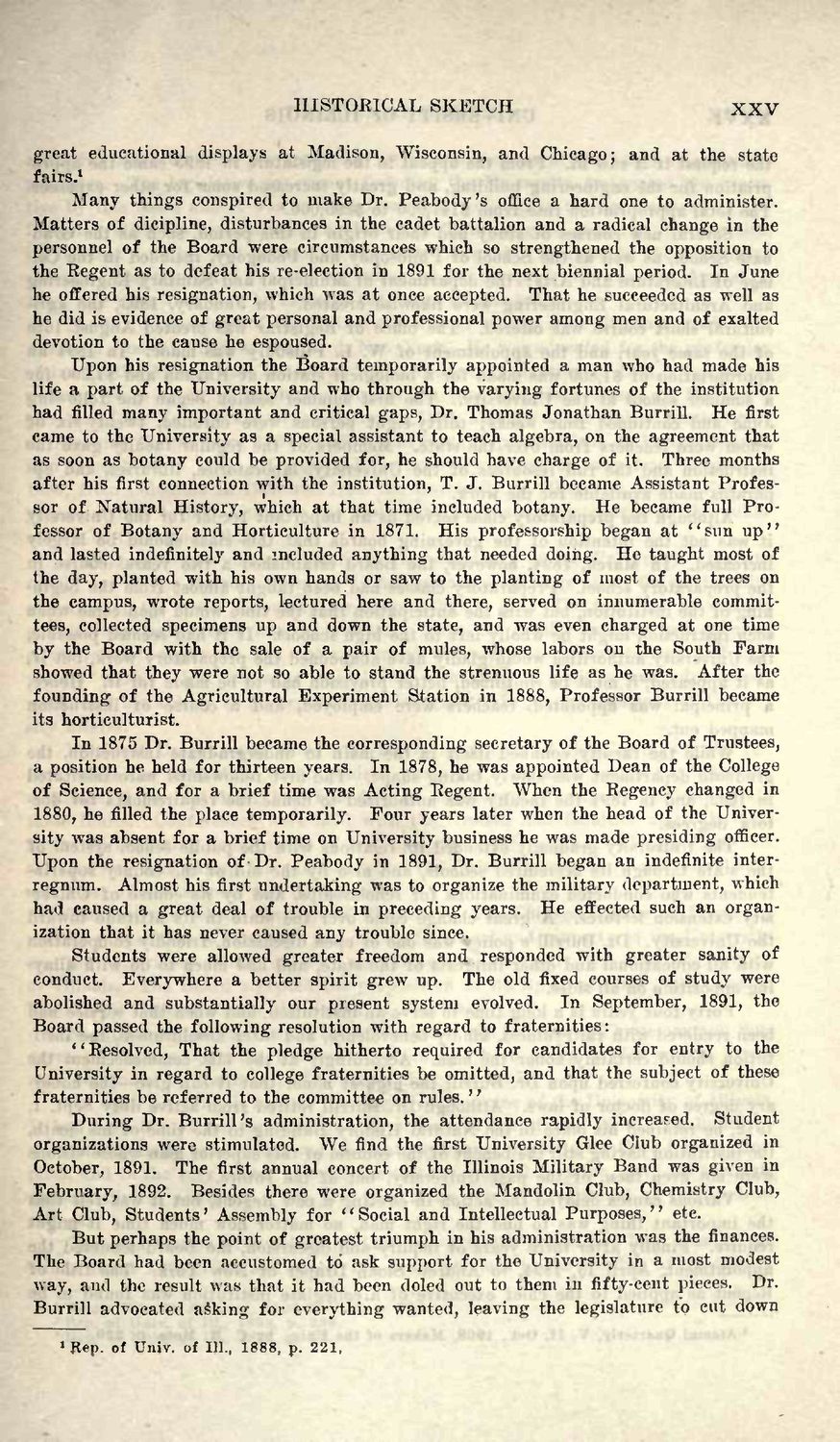| |
| |
Caption: Book - Early History of University (1916)
This is a reduced-resolution page image for fast online browsing.

EXTRACTED TEXT FROM PAGE:
HISTORICAL SKETCH XXV great educational displays at Madison, Wisconsin, and Chicago; and at the state fairs. 1 Many things conspired to make Dr. Peabody's office a hard one to administer. Matters of dicipline, disturbances in the cadet battalion and a radical change in the personnel of the Board were circumstances which so strengthened the opposition to the Regent as to defeat his re-election in 1891 for the next biennial period. In June he offered his resignation, which was at once accepted. That he succeeded as well as he did is evidence of great personal and professional power among men and of exalted devotion to the cause he espoused. Upon his resignation the Board temporarily appointed a man who had made his life a part of the University and who through the varying fortunes of the institution had filled many important and critical gaps, Dr. Thomas Jonathan Burrill. He first came to the University as a special assistant to teach algebra, on the agreement that as soon as botany could be provided for, he should have charge of it. Three months after his first connection with the institution, T. J . Burrill became Assistant Professor of Natural History, which at that time included botany. He became full Professor of Botany and Horticulture in 1871. His professorship began at " s u n u p " and lasted indefinitely and included anything that needed doing. Ho taught most of the day, planted with his own hands or saw to the planting of most of the trees on the campus, wrote reports, lectured here and there, served on innumerable committees, collected specimens up and down the state, and was even charged at one time by the Board with the sale of a pair of mules, whose labors ou the South Farm showed that they were not so able to stand the strenuous life as he was. After the founding of the Agricultural Experiment Station in 1888, Professor Burrill became its horticulturist. In 1875 Dr. Burrill became the corresponding secretary of the Board of Trustees, a position he held for thirteen years. I n 1878, he was appointed Dean of the College of Science, and for a brief time was Acting Regent. When the Regency changed in 1880, he filled the place temporarily. Pour years later when the head of the University was absent for a brief time on University business he was made presiding officer. Upon the resignation of-Dr. Peabody in 1891, Dr. Burrill began an indefinite interregnum. Almost his first undertaking was to organize the military department, which had caused a great deal of trouble in preceding years. He effected such an organization that it has never caused any trouble since. Students were allowed greater freedom and responded with greater sanity of conduct. Everywhere a better spirit grew up. The old fixed courses of study were abolished and substantially our present system evolved. In September, 1891, the Board passed the following resolution with regard to fraternities: "Resolved, That the pledge hitherto required for candidates for entry to the University in regard to college fraternities be omitted, and that the subject of these fraternities be referred to the committee on r u l e s . ' ' During Dr. Burrill's administration, the attendance rapidly increased. Student organizations were stimulated. We find the first University Glee Club organized in October, 1891. The first annual concert of the Illinois Military Band was given in February, 1892. Besides there were organized the Mandolin Club, Chemistry Club, Art Club, Students' Assembly for " S o c i a l and Intellectual P u r p o s e s , " e t c But perhaps the point of greatest triumph in his administration was the finances. The Board had been accustomed to ask support for the University in a most modest way, and the result was that it had been doled out to them in fifty-cent pieces. Dr. Burrill advocated asking for everything wanted, leaving the legislature to cut down > Rep. of Univ. of III., 1888, p. 221,
| |